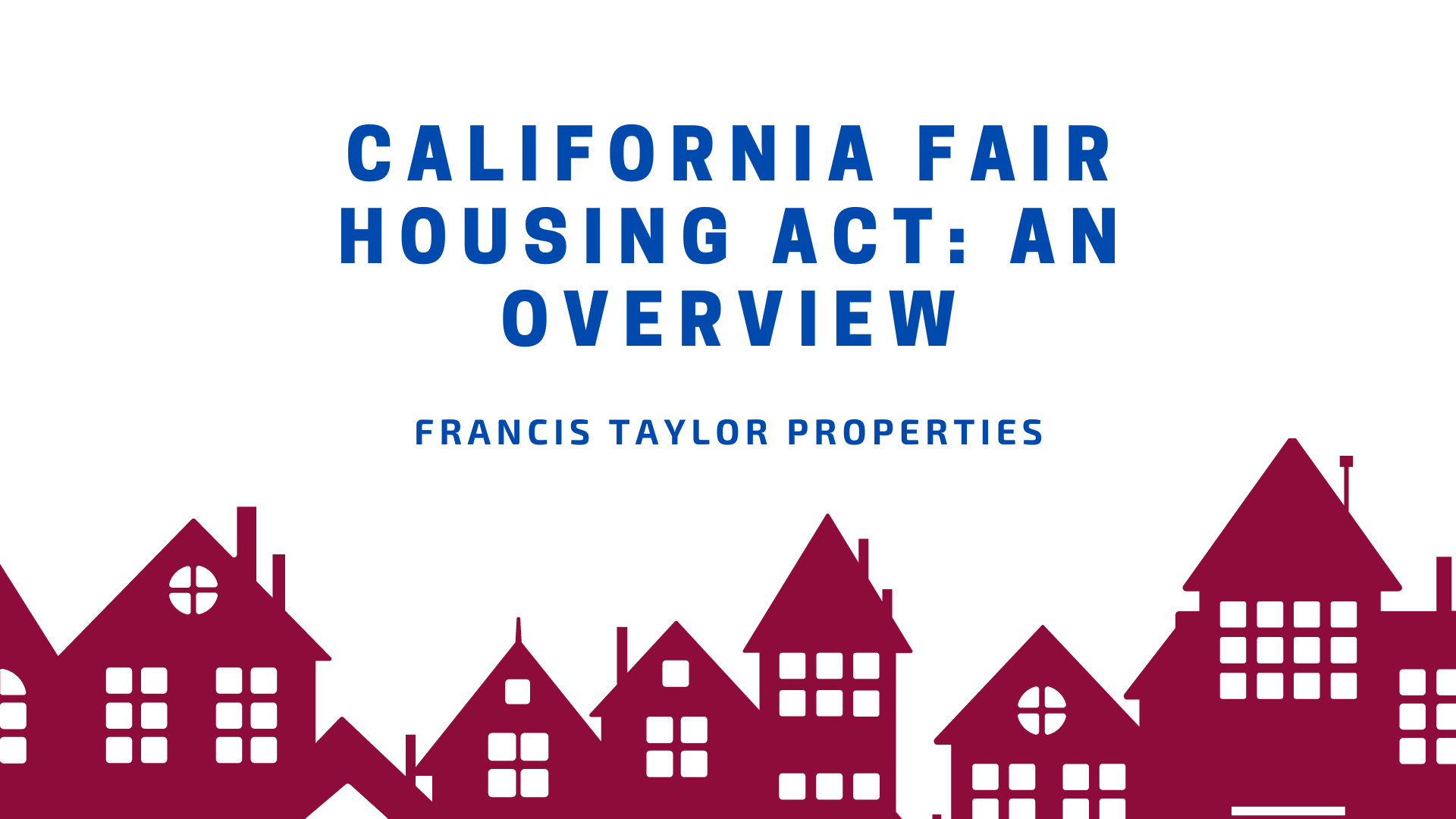This article provides landlords a comprehensive overview of the federal Fair Housing Act, ensuring you understand its federal law provisions and how they apply to your rental business.
From preventing housing discrimination to embracing diversity, mastering these guidelines not only complies with the federal law but also enhances your reputation as a California landlord.
Let’s dive into the essentials of fair housing practices, helping you to create an inclusive and legal rental environment.
An Introduction to the Fair Housing Act in California
As a landlord in California, it's crucial to stay informed about all landlord-tenant laws, including the federal law such as the Fair Housing Act, which protects your tenants from housing discrimination.
These state fair housing laws help ensure that everyone has an equal opportunity to rent a home free from housing discrimination regardless of their protected class. The protected classes in California include:
Race
Color
Religion
Sex/gender
Gender identity or gender expression
Sexual orientation
Marital status
Medical Condition Military or veteran status
National origin
Ancestry
Disability
Genetic information
By understanding this California fair housing law, you not only comply with legal requirements but also create a welcoming and diverse community at your properties. It’s all about providing fair chances for everyone looking to call your property their home.
Why Landlords Should Adhere to California Fair Housing Laws
Simply put, the prosperity of your rental business hinges on it. Violating these fair housing laws can result in illegal housing discrimination with hefty fines and the potential loss of your license.

Here are three core principles underscored by the Federal Fair Housing Act:
1. Non-Discrimination: The U.S. Department of Justice outlines in the Fair Housing Act that it is prohibited for housing providers and homeowners to discriminate against individuals seeking housing. This means California landlords and California homeowners cannot deny rental or sale based on the protected classes listed above.
2. Equal Treatment: Additionally, fair housing laws forbid housing providers from charging inflated rents and illegal housing discrimination based on any protected class.
3. Fair Advertising: Federal fair housing laws also prohibits California landlords from advertising properties in a manner that constitutes housing discrimination against specific groups. This means refraining from ads that implicitly exclude certain demographics, such as "no children allowed" .
Who Oversees Fair Housing in California?
The Department of Fair Employment and Housing holds this responsibility. Endowed with the authority to investigate housing discrimination complaints, this department can levy fines or penalties on landlords or homeowners found in violation of anti-discrimination statutes.
Prohibited Actions Under Fair Housing Act
As a landlord in California, it's important to understand what actions are prohibited under California fair housing laws to ensure you're operating legally and ethically.
Here’s a simple breakdown of what you can't do under fair housing laws, based on protected classes such as race, religion, gender, and others:
Refusing Housing: You cannot refuse to rent, sell, or negotiate housing. You also cannot make housing unavailable to a person because of their membership in a protected class, such as disability, gender, or religion
Altering Terms and Conditions: Providing different leasing terms, conditions, or privileges based on someone’s protected class is illegal.
Misleading Availability: It’s wrong to falsely deny that a property is available for inspection, sale, or rental.

Reasonable Accommodations: When necessary, you must make reasonable accommodations and for tenants in order to provide them with an accessible home.
Discriminatory Statements and Ads: Making statements or publishing rental advertisements that indicate a preference, limitation, or housing discrimination based on protected class characteristics are prohibited. For example saying "great for a Christian family" can be seen as discrimination against other religions.
Steering: You should avoid directing or influencing a person’s housing choices based on protected class characteristics in any aspect of the buying or renting process.
Blockbusting: It’s illegal to persuade a California homeowner to sell or rent by suggesting that people of a certain protected class are moving into the neighbourhood, usually implying a negative impact.
Lending Discrimination: Offering worse lending terms or conditions for residential real estate transactions based on someone’s protected class is forbidden.
Restricting Services: Denying a person access to, or membership in, a facility or service related to housing, such as a multiple listing service, is not allowed.
Understanding and adhering to these rules will help you manage your rental properties fairly and legally, promoting a positive and inclusive community.
Fair Housing Rules for Landlords Regarding Tenants with Disabilities in California
As a landlord in California, it’s important to understand your responsibilities when renting to individuals with disabilities.
Disabilities can include physical or mental impairments such as mobility, hearing or visual challenges, emotional or mental illnesses, and others that significantly limit major life activities.

Here's what you need to know:
Modifications
You must allow California tenants with disabilities to make necessary modifications to their living space or common areas. This could include grab bars for those with a mobility disability or modifications to the sink area for accessibility.
This could be at the tenant's expense, and you might ask them to revert the property to its original state when they move out, provided this is reasonable.
Accommodations
You are required to accommodate changes in rules, policies, or services to assist tenants with a disability better. For example, even if you have a 'no pets' policy, you must allow a tenant with a visual impairment to keep a service animal.
Similarly, if you usually have unassigned parking, you should accommodate a request from a tenant with a mobility disability for a reserved parking spot near their apartment to ensure they have easy access.
Conclusion
In conclusion, it's imperative for you as a landlord to understand the importance of remaining compliant with California Fair Housing laws. Adherence to these laws will ensure effective property management.
Understanding and navigating these regulations can seem daunting, so if you have any questions or concerns don’t hesitate to reach out to the property management experts at Francis Taylor.
If you are in need of a professional property management company, consider Francis Taylor Properties. We offer expert guidance and support to ensure your properties meet all legal requirements, allowing you to focus on what you do best.
Disclaimer: Please note that the information provided in this blog is intended for general guidance and should not be considered as a replacement for professional legal advice. It is important to be aware that laws pertaining to property management may change, rendering this information outdated by the time you read it.



